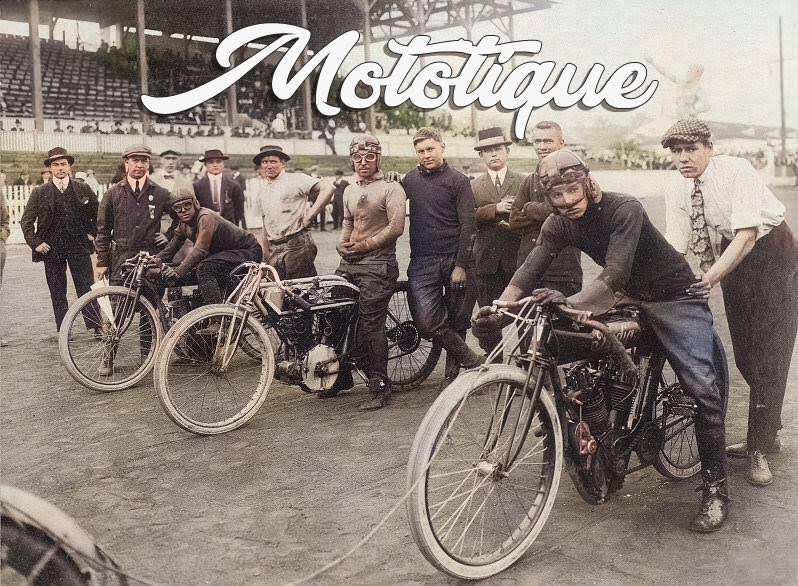January 3, 2014
Updated - July 8, 2014
By: David L. Morrill
@ Deadly Dave's Blog
@ Deadly Dave's Blog
Sylacauga, Alabama
 |
| Gene Walker - 1923 |
They say a pictures worth a thousand words, and this old photo certainly is worth a few. To start with, Daytona 200 winner Don Emde sent me this photo as part of some research I was doing a few years back. It was taken in 1923, and the rider is Gene Walker of Birmingham, Alabama.
Now some folks will tell you, Gene Walker rode Indian Motorcycles, and that is mostly true. From the time the Birmingham Indian dealer, Bob Stubbs, first put young Walker on and eight valve Indian racer at the Alabama State Fairgrounds, through many of his race wins, and numerous track records, Gene Walker raced Indians.
So, how did one of the most famous Indian riders of his time, come to be photographed on a Harley-Davidson racer?
And even more interesting, how did he become part of Harley-Davidson's 1923 advertising?
The story starts with America's entry into World War I. Professional racing was curtailed, and Indian factory rider, Gene Walker, returned to Birmingham. As his widowed mother's sole support, Walker was exempted from the draft. He found work as a motorcycle machinist at the Harley-Davidson shop run by Bill Specht. During the winter, Walker supplemented his income working as a Birmingham Motorcycle Police Officer. Walker also kept his hand in racing, winning a few non-championship races, at Atlanta's Lakewood Speedway on a privately entered Harley-Davidson.
With his return to the Indian Racing Team in 1919, Gene Walker again won races, set track records, and even set the first officially recognized motorcycle land speed record for Indian.
So, how did he come to fall into disfavor with the management at Indian?
In July 1921, Walker agreed to compete in the biggest race of the year, the 300 Mile Coyote Classic in Dodge City, Kansas. A few days before the race, Walker notified his bosses he would not compete at Dodge City. Walker contended that the Dodge City track was dusty, and dangerous, but he may have had another reason.
Just two weeks later, Walker entered a race in South Bend, Indiana. His bosses at Indian, accused him of "cherry picking" races for easy wins, and purses. The dispute played out in the motorcycle press for the next month. Walker continued to win races on Indians, and it appeared the dispute was settled, until Walker was unexpectedly released by Indian at the end of the 1921 reaching season. The reason given by Indian's Management, was his failure to meet his contractual obligations by not competing at Dodge City.
Walker returned to Birmingham, and he appears to have gone back to work at the Harley-Davidson shop. He also resumed his duties as a motorcycle police officer. That story was picked up by newspapers across the country.
 |
| Santa Cruz, CA. News - December 1923 |
 |
| Gail Joyce Motor Company (center) - Birmingham, AL ca. 1931 Birmingham, Alabama Public Library Archives - O.V. Hunt Collection |
Harley-Davidson may have also seen it as an opportunity to thumb their nose at their racing rival Indian. However, it came about, Walker began to dominate the short track races around the country, and Harley-Davison took full advantage of the publicity his wins brought them.
 |
| Harley-Davidson Ad - 1923 |
By the end of the 1923 season, Indian rehired Walker. He quickly rewarded them with a win on the board track at Los Angeles, and later wins at the Ascot Speedway. Sadly, Gene Walker died of injuries he sustained in a crash at the half mile dirt track at East Stroudsburg, Pennsylvania in June 1924.
So, what became of the factory for valve Harley-Davidson racer in the photo?
I wish I knew. None of the Harley-Davidson blanked off four valve racers seem to have survived. Like their big brothers, the twin cam eight valve racers, they were very rare. I can only hope it's hiding undiscovered in some dark corner of a Birmingham warehouse. If it does turn up, I sure hope I get the first call. It will certainly take very deep pockets to own it!
Sources:
Birmingham, Alabama Public Library Archives - O.V. Hunt Collection
Santa Cruz, CA. News
